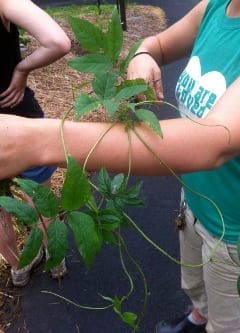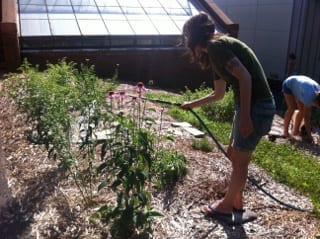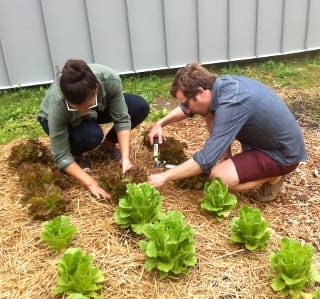by Shannon Dry and Abrah Jordan Dresdale
Permaculture can be explained as a two-step practice: 1) observing the beneficial relationships, patterns, and processes found in ecosystems, and then, 2) mimicking those relationships in the design of systems that meet human needs equitably while regenerating the land. The student initiated and implemented permaculture garden at Greenfield Community College (GCC), Greenfield, MA, mimics the patterns and processes of nature by layering organic material to build soil fertility. Small-scale earthworks that mimic the variable topography of wild lands capture rainwater, which is then used to irrigate crops passively. The garden, which is home to a diverse palette of edible perennial crops, herbs, and flowers, mirrors the structural diversity of a forest ecosystem.
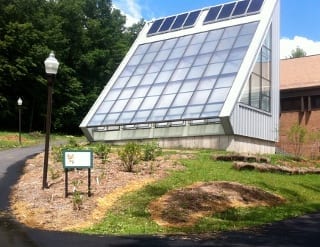
The Permaculture Garden in its first year occupies the college’s south ‘lawn’ downslope from the zero-net energy greenhouse.
In the GCC 2011 pilot year of Introduction to Food Systems, students from a research group focused on strategies for increasing food production in the Greenfield area. Their final project envisioned an educational permaculture garden on campus. The rationale, they argued, is that a permaculture garden sited at GCC would be a strategic leverage point for demonstrating how food can be grown on marginal land (such as small parcels, sloped terrain, or land with degraded soil). The college’s visibility and accessibility in the community would enable groups interested in permaculture to easily visit a demonstration garden. Those attending un-related events at the college could be exposed to permaculture for the first time. Furthermore, the garden could be integrated into curricula at the college, thus benefiting students, faculty, and staff alike.
Planning for Food Security and Community Resilience
If residents of Greenfield and Western Massachusetts could learn how to cultivate their small piece of this earth—oftentimes yards or small farms with a significant slope and/or thin, rocky glacial till topsoil—and transform it into a productive landscape, the region could move forward even further with its efforts in food security and community resilience. And that’s not to mention the additional benefits of reducing the carbon footprint of food miles, being able to harvest and eat fresh food high in nutrition, and cultivating a personal connection with nature and the land from which one’s food is grown.
Six inspired students came out of the Introduction to Food Systems class and sought a pathway for how to advocate for and create a design for a permaculture garden on campus. The course instructor, Abrah Dresdale, taught a special topics class, The Permaculture Student Forum, for the visionary students to do just that. Ryan Harb of the University of Massachusetts Permaculture Initiative provided mentorship to the students along with a $1,000 micro-grant to help the garden get started. The seed of the project began to take root fueled by the students’ vision and paired with administrative support.
Arriving at a Design
The Permaculture Student Forum hosted a community-engaged stakeholder charrette involving over 50 participants at the college. They gathered a common vision and set of goals from the community, along with design ideas sketched on tracing paper with colorful markers. Key permaculture designers Dave Jacke, author of Edible Forest Gardens, and Keith Zaltzberg of Regenerative Design Group generously gave of their time to help guide the final stages of the design process towards a realistic implementation strategy.
The proposal submitted to the President of the college included plans for three phases of permaculture installations on GCC’s campus. The first phase laid out a design for a productive permaculture garden with polycultures of fruit-bearing shrubs and groundcover, perennial vegetables, annual vegetables, medicinal and culinary herbs, and flowers. The second phase incorporated a micro-orchard near the garden. And the third phase demonstrated edible landscaping for all four seasons to be on display at the front entrance to the main building on campus.
To the college administration, the idea of the garden was compelling. “It’s not just that the garden is here, it’s that students are getting involved and learning by using their hands. So much learning happens not when people are working face to face, but when they work side by side like they do here in the garden,” said President Robert Pura. His President’s Staff approved of the first phase of design in summer 2012 and soil regeneration began that fall.
Project Implementation
As a keystone to the Farm and Food Systems Liberal Arts degree program, the garden is integrated into the Permaculture Landscape Installation, Introduction to Food Systems, Organic Gardening, Soil Science, Horticulture, Botany, and Permaculture Design courses at the college. Through these classes, students took ownership in all aspects of project installation. Students gathered soil samples for testing, added organic soil amendments, and aerated the compacted earth with broadforks in Soil Science. They dug swales and rain gardens in the Permaculture Landscape Installation class. In the Permaculture Club – which maintains the garden during the academic year – students layered cardboard from the recycling bins with newspapers from the library. Then, they topped off the cardboard with finished compost salvaged from the bottom of the massive leaf collection pile on campus. Lastly they mulched the organic matter with straw left over from the Natural Building class.
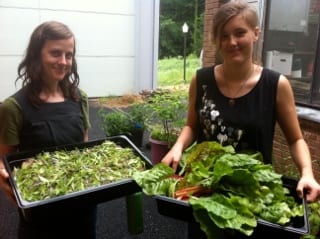
The GCC Dining Commons incorporates the fresh produce like these microgreens and chard into its daily offerings.
The project embodies over a dozen permaculture principles, such as “use on-site resources” and “biological resources.” It also demonstrates the power of using non-financial forms of capital—such as natural capital (such as straw), experiential capital (gained in related courses), and social capital (community connections with area designers, for instance). Through a collegial relationship with Lisa Depiano of Mobile Design Lab, she donated $900 worth of mature plant stock for the garden. GCC Faculty Brittany Nickerson of Thyme Herbal of Amherst, MA, also donated herbs. Field trip site Food Forest Farm in Holyoke, MA, provided free perennial edible starts. In spring 2013, 30 faculty, staff, and students from all different departments on campus, along with community residents, came out to install the garden during the Community Planting Day. Many reported it was the “best day of work/school” in their lives.
Arriving at Harvest
Throughout the summer, GCC student interns sustain the garden and receive college credit for their work. The food they harvest supplies the campus food pantry and dining commons (which also sources produce and dairy regionally). Currently, the garden is producing strawberries, rhubarb, juneberries, Turkish rocket, sea kale, beach plums, water celery, and blueberries along with annual crops such as tomatoes, garlic, onions, watermelon, cantaloupe, chard, and kale. There is also a hearty patch of indigo that will be harvested to make dye for the Art Department.
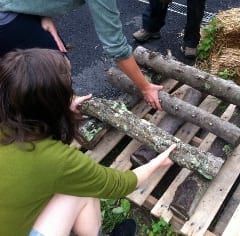
Students in the Mushroom Cultivation class, part of the hands-on GCC Re-skilling Series, inoculate logs with spawn that will yield delicious shitake mushrooms for several years.
Exciting future plans to demonstrate best practices in permaculture on the campus are in place. The near zero-net energy greenhouse – just upslope of the permaculture garden – will soon have a rainwater catchment funded by a National Science Foundation grant awarded to the college. This system, designed to collect stormwater from the greenhouse roof, will divert the water out of storm drains; instead, it will be used to irrigate the garden below. The annual garden beds continue to expand with each Organic Gardening class. This fall, the Permaculture Club will install low-tunnels to extend the growing season well into the winter. The college is also developing plans for a botanical garden adjacent to the permaculture garden that will include the phase II micro-orchard installation.
To watch the GCC Permaculture Garden documentary (working version), visit www.gcc.mass.edu/farmandfoodsystems and look under “News & Announcements” on the right side of the web page.
To view the student designs and proposal, visit: http://issuu.com/abrahdresdale/docs/gcc_permaculture_garden_proposal.
About the Authors
Abrah Jordan Dresdale is certified in Permaculture Design and holds a Master’s degree in Sustainable Landscape Design and Planning from the Conway School, where she co-authored Feed Northampton, a food security plan for the city of Northampton. She is principal of Feeding Landscapes, a design business which specializes in edible landscapes and local food systems planning. Since 2011, Abrah has taught Introduction to Food Systems and Permaculture Design at Greenfield Community College. She is Coordinator of the Farm and Food Systems program, co-advises the Permaculture Club, and serves as the Garden Coordinator for ‘Living Laboratory’ permaculture garden on campus. Abrah may be reached at feedinglanscapes@gmail.com.
Shannon Dry is a recent graduate of GCC’s Farm and Food program. She is currently studying Sustainable Farm and Food Systems and Environmental Design at UMASS Amherst. While at GCC, she was president of the Permaculture Club and also received her Permaculture Design certificate. Shannon currently works for Real Pickles, a worker-owned cooperative business in Greenfield, MA that produces 100% organic and raw pickled products using produce from local family farms.

